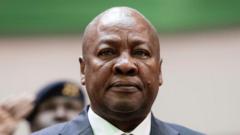Are US Deportees Right to Sue Ghana for Illegal Detention?

Published: 2025-09-18 18:30:30 | Category: world
This article explores the recent legal actions taken by eleven individuals detained in Ghana after being deported from the United States. Their lawyer argues that their detention is illegal, as they have not violated any local laws. The case sheds light on the complexities surrounding deportation agreements and immigration policies between the US and Ghana.
Last updated: 30 October 2023 (BST)
Key Takeaways
- Eleven deportees from the US are currently detained in Ghana, prompting a legal challenge.
- Their lawyer claims the detention is unlawful, as they have not breached any Ghanaian laws.
- The Ghanaian government is under pressure from opposition MPs to suspend deportation agreements with the US.
- The issue highlights ongoing tensions in US immigration policies under the Trump administration.
- Some detainees are also suing the US government, claiming legal protections against deportation.
Background on the Deportation Case
The recent deportation of eleven individuals from the United States to Ghana has sparked a significant legal battle. The deportees were reportedly held in a US detention facility before being forcibly deported on a military cargo aircraft. Their lawyer, Oliver-Barker Vormawor, is advocating for their immediate release, arguing that their detention is not only unjust but also illegal under Ghanaian law.
Legal Claims Against the Ghanaian Government
In the court application, Vormawor states that the government must justify the detention of these individuals, as there are no charges or violations of Ghanaian law against them. The detainees maintain that they are victims of a broader political issue tied to US immigration policies rather than any wrongdoing on their part.
Government Response and Political Pressure
While the Ghanaian government has yet to respond officially to the lawsuit, there has been political discourse surrounding the deportation agreement with the US. Opposition Members of Parliament have called for an immediate suspension of the deportation deal until it is ratified by parliament, citing compliance with local laws. This highlights a growing concern regarding the implications of such agreements on national sovereignty and the treatment of deportees.
Deportation Policies Under Scrutiny
The situation is further complicated by contrasting statements from Ghana's President John Mahama and Foreign Minister Samuel Okudzeto Ablakwa regarding the status of the deportees. Mahama claimed that all deportees had been returned to their countries of origin, while Ablakwa indicated that not all had been accounted for. This discrepancy has raised questions about the transparency of the government’s handling of deportations.
Immigration Policies of the Trump Administration
The deportations are part of a broader strategy by the US government aimed at enforcing stricter immigration policies, particularly under the Trump administration. Since taking office, President Trump has made it clear that record-level deportations are a priority, often leading to significant international repercussions, including strained relations with countries like Ghana.
Humanitarian Concerns and Pan-African Empathy
Ghana's Foreign Minister has stated that the decision to accept deportees from the US was made on the basis of "humanitarian principles and pan-African empathy." However, he also clarified that this should not be interpreted as an endorsement of the harsh immigration policies being implemented by the US. This raises questions about the ethical implications of such agreements and the treatment of vulnerable populations caught in the crossfire.
Legal Actions by Detainees Against the US Government
In addition to their lawsuit against the Ghanaian government, five of the detainees, including three Nigerians and two Gambians, have filed a suit against the US government. They argue that their deportation violated a court order that was designed to protect them from such actions. This aspect of the case further complicates the legal landscape surrounding deportations and highlights the potential for conflicting legal interpretations across jurisdictions.
What Happens Next?
The outcome of these legal proceedings could have significant implications for the future of deportations between the US and Ghana, as well as for the rights of individuals facing deportation more broadly. As the situation develops, it will be essential to monitor how both governments respond to the ongoing legal challenges and the public discourse surrounding immigration policies.
Implications for Ghana and Deportation Agreements
This case has broader implications for Ghana and its relationship with the US. The ongoing debate surrounding the legality and morality of deportation agreements raises critical questions about national sovereignty, human rights, and the treatment of deportees. As Ghana continues to navigate its foreign policy, the outcome of this case may influence future agreements and the country’s approach to immigration issues.
Conclusion
The legal battle surrounding the eleven deportees highlights the complexities and challenges of international deportation policies. As Ghana faces scrutiny over its handling of these cases, the outcomes could set precedents for future deportation agreements and the treatment of individuals caught in immigration enforcement actions. As the legal proceedings unfold, the intersection of legal, ethical, and political dimensions will remain critical to watch.
FAQs
Why were the eleven individuals deported from the US?
The eleven individuals were deported as part of the US government's enforcement of stricter immigration policies under the Trump administration, targeting those in the country illegally.
What legal claims are being made by the detainees in Ghana?
The detainees claim that their detention is illegal under Ghanaian law, as they have not committed any local offences. Their lawyer is seeking to have them released and is demanding the government justify their detention.
What is the stance of the Ghanaian government regarding the deportation agreement?
The Ghanaian government has expressed a willingness to accept deportees based on humanitarian principles, though opposition MPs are calling for a suspension of the agreement until it is ratified by parliament.
Are other deportees still in detention?
According to the court application, eleven deportees are still in detention in Ghana, despite conflicting statements from government officials regarding their status.
What are the implications of these legal battles?
The outcomes of these cases could influence future deportation policies and agreements between the US and Ghana, affecting how deportees are treated and the legal frameworks surrounding such actions.
As the legal proceedings unfold, it will be crucial to observe how deportation policies evolve and what implications they may have for individuals facing similar challenges worldwide. #Deportation #Ghana #ImmigrationPolicy



